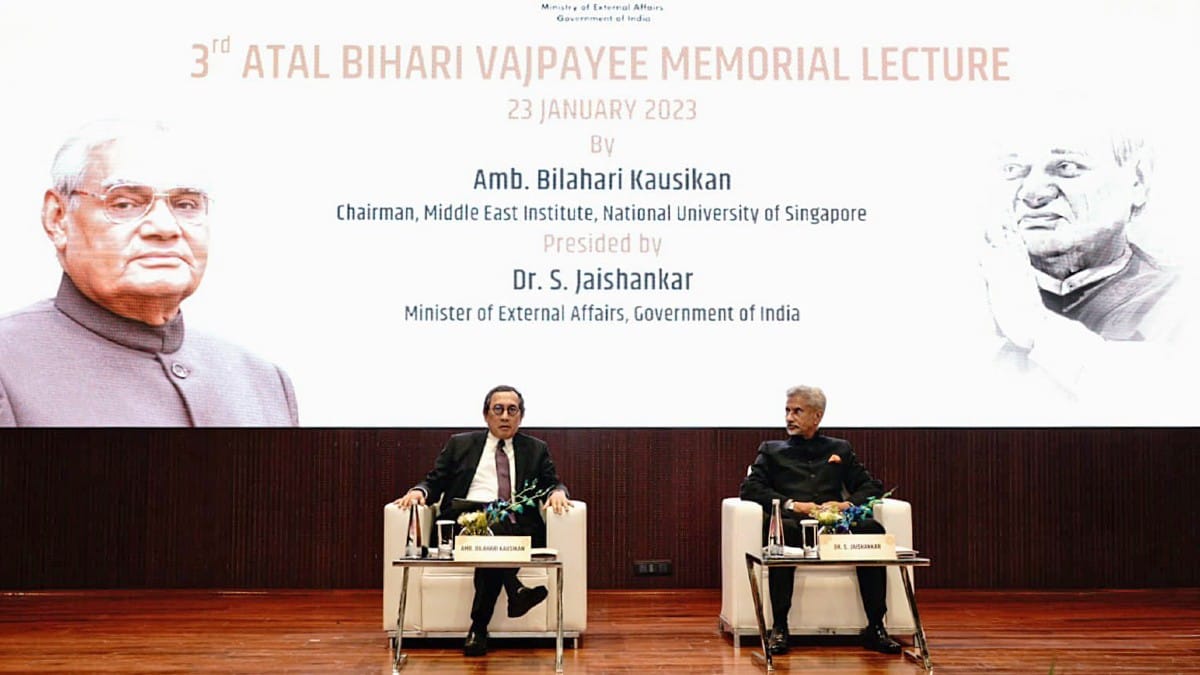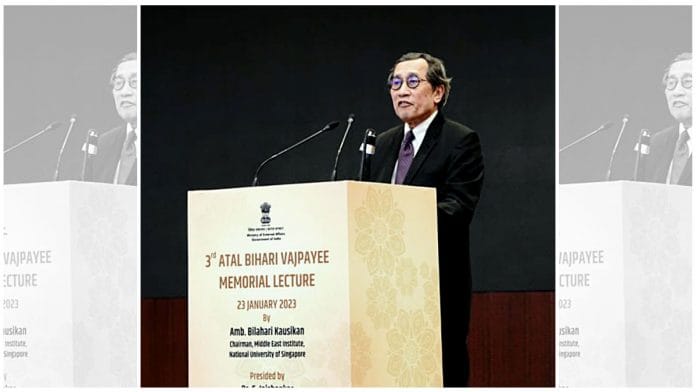New Delhi: Countries like India may find it easier to navigate a new world order and unlike the Cold War, will no longer be faced with “binary” choices, said former Singaporean diplomat Bilahari Kausikan, who served the island nation as its ambassador to Australia, Russia, the United Nations and in other capacities throughout his extensive career.
Delivering the 3rd Atal Bihari Vajpayee Memorial Lecture in New Delhi Monday, Kausikan spoke about the future of the international order given the intense US-China rivalry, as well as the war in Ukraine.
In his speech, titled “The Future of Global Uncertainty”, the career diplomat distinguished the rivalry between the US and China from the Cold War, calling the emerging world order one of “dynamic multipolarity”.

“Shifting combinations of regional middle powers and smaller countries will continually arrange and rearrange themselves in variegated and overlapping patterns along the central axis of US-China relations,” he said.
He added, “I believe that India and Singapore may find it relatively easier than most, because what is required is largely already our diplomatic modus operandi.”
The Atal Bihari Vajpayee Memorial Lecture series, organised as a tribute to the former prime minister, was initiated in 2018. The first lecture was delivered by former Union Finance minister late Arun Jaitley.
During the event Monday, External Affairs minister (EAM) Dr S. Jaishankar also offered remarks, praising Vajpayee’s handling of the diplomatic situation following the 1998 Pokhran nuclear tests.
Also Read: What shunting ‘wolf warrior’ Zhao out of foreign ministry could mean for Chinese diplomacy
US-China strategic rivalry not new
During his speech, Kausikan remarked that the intense rivalry between the US and China is not out of the ordinary, given competition is an inherent characteristic of international relations and at times, can turn into conflict.
“They are new variants of old plots within established patterns of state behaviour,” he said.
The US and China have been engaged in an intense rivalry over the past few years, characterised by a trade war, competing influences in various regions around the world, territorial disputes in the South China Sea and Taiwanese independence.
Washington continues to see Beijing as its primary strategic threat, as elucidated in the Pentagon’s National Defense Strategy released last year.
Unlike the Cold War, however, the US and China are “irreplaceable parts” of the global system and enmeshed with each other through a complex web of supply chains, explained Kausikan.
“Neither the US nor China are comfortable with this situation, because their interdependence also exposes their mutual vulnerabilities,” said the former diplomat and now chairman of the Middle East Institute at the National University of Singapore.
Kausikan cited the global semiconductor shortage as an example of how both the US and China hold critical levers in the sector.
No more ‘binary’ choices
Due to the complex nature of the US-China rivalry, countries like India and Singapore no longer have binary choices like they did during the Cold War, said Kausikan.
He added that the US and China, however, want countries to pick a side and Beijing, in particular, “devotes a great deal of resources on influence operations intended to impose false binary choices on us”.
As for the US, Kausikan distinguished former US president Donald Trump’s approach to foreign policy and the China challenge to Joe Biden’s.
“Trump made unilateral and crudely transactional demands. Mr Biden is consultative, but…if you do not meet expectations, Mr Biden will probably still be polite, but you should not expect to be taken too seriously,” opined the former diplomat.
He added that the shift to a more “transactional” American foreign policy, polite or otherwise, is permanent.
Also Read: China challenge, India’s importance — 10 highlights of Japan PM Kishida’s speech at Johns Hopkins
Xi won’t survive failed war with Taiwan
During his address, Kausikan noted that unlike Russian President Vladimir Putin, who will likely survive a botched war with Ukraine, no Chinese leader will survive a failed war with Taiwan.
“If China starts a war over Taiwan, it must win and it must win quickly. Putin can survive, I think probably will survive a botched war against Ukraine. But no Chinese leader will survive a failed war against Taiwan,” he said.
Adding that China still lacks the capability and the experience to launch a military operation to take control of Taiwan.
The question over Taiwan’s independence is a key facet of the US-China rivalry that seemingly came to a head with then US House of Representatives speaker Nancy Pelosi’s visit to the island last August which invited stinging criticism from Beijing.
China’s ‘tepid’ stance on Ukraine
During his speech, Kausikan described China as being in an “awkward” position vis-à-vis the war in Ukraine, adding that Russia may not be entirely satisfied with Beijing’s “tepid” stance.
“Moscow cannot be happy with Beijing’s tepid support that has highlighted the limits to their so-called No Limits partnership,” said Kausikan, referring to a joint statement issued by Russia and China in February last year in which they proclaimed a deep strategic partnership with “no limits”.
He further added that the most probable outcome of the situation in Ukraine is a “prolonged war” that will eventually taper off into a “frozen conflict”.
(Edited by Amrtansh Arora)
Also Read: Era of Russian fossil fuels over in Europe, need to isolate Moscow, says EU Ambassador to India






